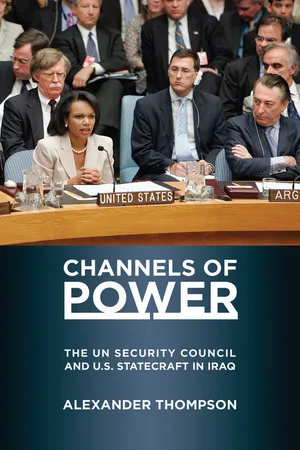
- English
- ePUB (mobile friendly)
- Available on iOS & Android
About this book
When President George W. Bush launched an invasion of Iraq in March of 2003, he did so without the explicit approval of the Security Council. His father's administration, by contrast, carefully funneled statecraft through the United Nations and achieved Council authorization for the U.S.-led Gulf War in 1991. The history of American policy toward Iraq displays considerable variation in the extent to which policies were conducted through the UN and other international organizations.
In Channels of Power, Alexander Thompson surveys U.S. policy toward Iraq, starting with the Gulf War, continuing through the interwar years of sanctions and coercive disarmament, and concluding with the 2003 invasion and its long aftermath. He offers a framework for understanding why powerful states often work through international organizations when conducting coercive policies-and why they sometimes choose instead to work alone or with ad hoc coalitions. The conventional wisdom holds that because having legitimacy for their actions is important for normative reasons, states seek multilateral approval. Channels of Power offers a rationalist alternative to these standard legitimation arguments, one based on the notion of strategic information transmission: When state actions are endorsed by an independent organization, this sends politically crucial information to the world community, both leaders and their publics, and results in greater international support.
Frequently asked questions
- Essential is ideal for learners and professionals who enjoy exploring a wide range of subjects. Access the Essential Library with 800,000+ trusted titles and best-sellers across business, personal growth, and the humanities. Includes unlimited reading time and Standard Read Aloud voice.
- Complete: Perfect for advanced learners and researchers needing full, unrestricted access. Unlock 1.4M+ books across hundreds of subjects, including academic and specialized titles. The Complete Plan also includes advanced features like Premium Read Aloud and Research Assistant.
Please note we cannot support devices running on iOS 13 and Android 7 or earlier. Learn more about using the app.
Information
Table of contents
- Preface
- 1. The Power of International Organizations
- 2. Coercion, Institutions, and Information
- 3. The Security Council in the Gulf War, 1990–1991
- 4. Coercive Disarmament
- 5. The Second Iraq War
- 6. The Second Iraq War
- 7. Conclusion
- Appendix
- Bibliography